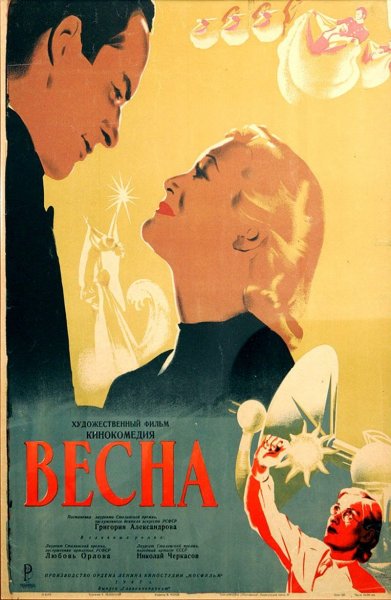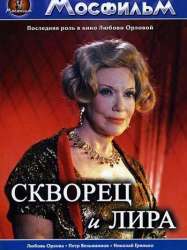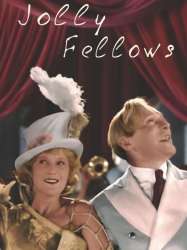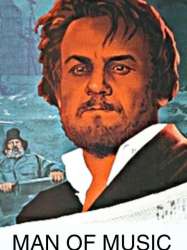Spring is a russe film of genre Comedy directed by Grigori Alexandrov released in USA on 11 november 1947 with Nikolai Cherkasov
Spring (1947)
Весна

If you like this film, let us know!
Le Printemps (en russe : Весна) est une comédie musicale soviétique réalisée par Grigori Aleksandrov et sortie en 1947.
Synopsis
Voulant réaliser un film sur une scientifique célèbre, un réalisateur lui cherche un sosie qui pourrait tenir ce rôle. Il en trouve un mais celle-ci débordée entre ses différentes activités peine à tenir le rôle. L'assistant du réalisateur tente alors de convaincre la scientifique de tenir le rôle de façon incognito en se faisant passer pour le sosie.Actors

Nikolai Cherkasov
(Arkadi Mikhailovich Gromov)

Lioubov Orlova
(le professeur Irina Nikitina et Vera Giorgieva Shatrova)

Faïna Ranevskaïa
(Margarita Lvovna, housekeeper)

Rina Zelionaïa
(Gabby Film Makeup Designer)

Alekseï Konsovski
(acteur)

Georgi Yumatov
(Makeup Designer Assistant)
Comments
Leave comment :
Suggestions of similar film to Spring
There are 47 films with the same actors, 11 films with the same director, 51779 with the same cinematographic genres (including 202 with exactly the same 4 genres than Spring), to have finally 70 suggestions of similar films.If you liked Spring, you will probably like those similar films :

Starling and Lyre (1974)
, 2h22Directed by Grigori Alexandrov
Genres Drama, War, Thriller, Adventure, Spy, Romance
Themes Spy films
Actors Lioubov Orlova, Piotr Veliaminov, Nikolai Grinko, Rina Zelionaïa, Rimma Markova, Boris Seidenberg
Rating43%






Volga - Volga (1938)
, 1h44Directed by Grigori Alexandrov
Genres Comedy, Musical theatre, Musical
Themes Films about music and musicians, Musical films
Actors Lioubov Orlova, Igor Ilinski, Andreï Toutychkine, Valentina Kibardina, Vsevolod Sanaïev
Rating65%





Byvalov, chef carriériste et bureaucrate d'une petite ville de province rêve de s'établir à Moscou. Il reçoit un télégramme de la capitale pour présenter des équipes de musiciens amateurs aux Olympiades musicales de Moscou, mais estimant qu'il n'y a pas de talent dans sa petite ville, Byvalov ne veut envoyer personne. Il existe deux orchestres d'amateurs en ville, l'un de musique classique, l'autre de musique populaire. Ils essayent en vain de convaincre le chef du soviet municipal. Finalement Byvalov, accepte de partir en bateau sur la Volga pour rejoindre Moscou, avec l'orchestre de musique classique. L'autre équipe, dirigée par Dounia (Lioubov Orlova), s'y rend par ses propres moyens et arrive avant les autres.

Circus (1936)
, 1h34Directed by Grigori Alexandrov
Genres Comedy, Musical theatre, Musical, Melodrama
Themes Circus films, Films about music and musicians, Théâtre, Musical films, Films based on plays
Actors Lioubov Orlova
Rating65%





Orlova plays an American circus artist who, after giving birth to a black baby (played by James Lloydovich Patterson), immediately becomes a victim of racism and is forced to stay in the circus, but finds refuge, love and happiness in the USSR. Her black son is embraced by friendly Soviet people. The movie climaxes with a lullaby being sung to the baby by representatives of various Soviet ethnicities taking turns.

Jolly Fellows (1934)
, 1h36Directed by Grigori Alexandrov
Origin Russie
Genres Comedy, Musical theatre, Musical
Themes Films about music and musicians, Musical films
Actors Lioubov Orlova, Leonid Utyosov
Rating68%





Yelena (Mariya Strelkova), a well-off would-be singer who can't carry a tune, mistakes shepherd Kostya Potekhin (Leonid Utyosov) for a famous Italian conductor of a jazz orchestra and invites him to an elegant party held in her house. He plays his pan flute, which attracts the herd of animals from his kolkhoz to the dining tables. Yelena's servant Anyuta (Lyubov Orlova) falls for Kostya. But Kostya is attracted to Yelena, and when she turns him down following the discovery of his real identity, he is very upset. He leaves for the city to try himself as a professional musician and finds himself in many comical situations. Eventually he joins a jazz band consisting of young "jolly fellows". Kostya becomes a head of the band and it turns to be quite a challenge - not only is he supposed to manage the creative work and performances but he must also control his quick-tempered bandmates, whose fiery arguments sometimes turn rehearsals into a brawl that results in the band being turned out of the house by their landlord. Because of this the band is urged to rehearse before a forthcoming performance right in the street and even play at funerals for more practice. On a rainy evening Kostya and his band mates accidentally meet Anyuta on their way to a concert hall and take her with them. She is revealed to be an excellent singer, so she joins the band and they start to perform together successfully.

Man of Music (1952)
Directed by Grigori Alexandrov
Origin Russie
Genres Drama, Historical, Musical
Themes Films about music and musicians, Films about classical music and musicians, Musical films
Actors Lioubov Orlova, Andrei Popov, Vladimir Saveliev, Georgy Vitsin, Iouri Lioubimov, Rina Zelionaïa
Rating64%





The young composer Mikhail Glinka performs his new work at a soiree at earl Vielgorsky's house. However, the public is accustomed to Western music, and reacts coldly to the creation of the composer. This makes him very sad, but soon he decides to go learn the art of music in Italy.

Sentimental Romance (1931)
, 20minutesDirected by Sergueï Eisenstein, Grigori Alexandrov
Origin France
Genres Drama, Comedy, Musical, Romance
Rating64%





The film opens with a montage of scenes of elemental violence—crashing waves and falling trees alternate with images of trees speeding past as if viewed from a motorcar. The imagery gradually changes to more tranquil vistas of clouds, grass swaying in a breeze, and rippling water. The first interior shot shows a woman silhouetted against a window. There are several shots of a fireplace and of clocks and their pendulums. The woman moves from the window to a piano, and begins singing a Russian song. Partway through her song, she is surrounded by starbursts and the dark, indoor setting of the scene is replaced by radiant clouds. Images of swans are intercut with images of Rodin sculptures. Eventually the indoor setting returns and rain is seen falling against the night sky. After an interval, the sun is shown moving through the sky, and the singer finishes her song as flowering nature reappears.

The Great Farewell (1953)
Directed by Grigori Alexandrov, Mikhaïl Tchiaoureli, Sergueï Guerassimov, Ilya Kopaline
Origin Russie
Themes Politique, Documentary films about historical events, Political films
Rating18%






Hurray Mexico! (1979)
, 1h25Directed by Sergueï Eisenstein, Grigori Alexandrov
Origin Russie
Genres Documentary
Actors Serge Bondartchouk
There is no evidence that Eisenstein had any specific idea for a film about or set in Mexico before his actual arrival there in December 1930, although he began shooting almost immediately. The Sinclairs had made it clear that they were expecting Eisenstein to concentrate on visual imagery, and anything by way of a plot would be secondary: they were looking for an artistic travelogue. Furthermore, although the film was to have been completed by April 1931, it wasn't until about that time that Eisenstein even settled on the basic idea of a multi-part film, an anthology with each part focussed on a different subculture of the Mexican peoples. Only later still would this idea resolve itself into the concept of a six-part film encompassing the history of the nation, its people and its societal evolution to the present time. Specific details and the contents of each section, and how to connect them, would evolve further over the ensuing months while Eisenstein, Alexandrov and Tisse shot tens of thousands of feet of film. Toward the latter part of 1931, the film was finally structured, in Eisenstein's mind, to consist of four primary sections plus a brief prologue and epilogue.

Strike (1925)
, 1h18Directed by Sergueï Eisenstein, Grigori Alexandrov
Origin Russie
Genres Drama
Themes Politique, Films about the labor movement, Political films
Actors Grigori Alexandrov, Anatoly Kuznetsov
Rating75%





На заводе всё спокойно / At the factory all is quiet Using typography, the word "но" (but) is added to the title of the chapter which then animates and dissolves into an image of machinery in motion.

The General Line (1929)
, 2h11Directed by Sergueï Eisenstein, Grigori Alexandrov
Origin Russie
Genres Drama
Themes Films about the labor movement
Rating71%





Dans un village traditionnel, Marfa Lapkina est une pauvre paysanne qui ne possède même pas un cheval. Les koulaks, les paysans riches, refusent d'aider les plus pauvres. Marfa considère le communisme comme son seul espoir. Avec l'appui de jeunes communistes et de responsables du parti, elle lance l'idée d'une coopérative, un kolkhoze. Grâce au kolkhoze, les paysans apprennent le travail en commun et découvrent la mécanisation.
 Connection
Connection